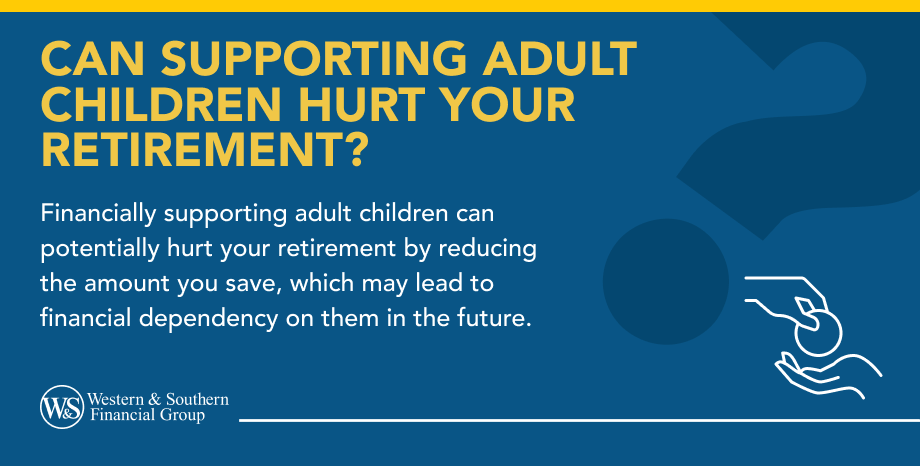

Table of Contents
Key Takeaways
- Nearly half of American parents provide financial support to adult children, often helping with significant one-time expenses like weddings or education.
- Many parents feel obligated to assist due to wage stagnation and high living costs impacting young adults today.
- Consistently supporting daily expenses such as rent and bills may hinder retirement savings goals.
- Set a budget for one-time purchases and consider a monthly allowance for ongoing support that aligns with your finances.
- Think about estate planning tools like life insurance to leave an inheritance, so you don't compromise your retirement savings to support adult children.
Parents supporting adult children face a dilemma: You want to help your children, but you also need to tend to your own financial future. How do you meet both of these competing needs?
If you are providing financial support to your adult kids, you're in excellent company. According to the Savings.com, 47% of American parents of adult children offer some sort of financial help to their kids.1 But helping your kids could end up affecting your retirement plans if you're not mindful. Here's what to consider about the costs of financially supporting adult children.
How Parents Financially Support Their Kids
Parents traditionally support adult children with large, one-time costs, such as a wedding, their education or a down payment on a house. Parents are still offering this kind of help because only 16.6% of couples paid for their wedding by themselves.2 The rest relied at least partly on financial help from their parents.
But some parents also help adult children with day-to-day expenses, such as groceries, bills, rent or mortgage, and student loans. These costs may individually be less expensive than the big ticket expenses, but they can add up.
A Tougher Economic Reality
Newly minted adults may face a tougher economic reality than you did: wages have stagnated, while costs have continued to go up.
There are a number of reasons for parents to want to help their kids succeed. But wage stagnation likely affects you, too. While you may have had more opportunities in early adulthood than your children, you also may not be as well off as your parents were at your age. The expenses of modern life could be affecting your bottom line and helping your kids may be further impacting your finances.
Prioritizing Retirement
It can be tempting to help your kids financially, but it could lead to saving less for your retirement. According to Bankrate, only 20% of baby boomers feel like they are right on track, while 66% are slightly behind in retirement savings.3
Prioritizing retirement ahead of helping your adult child with their finances may feel strange, but it could help avoid needing to rely on your kids financially when you retire.
Cutting the Financial Cord
Your strategy for helping to reduce your financial support to your adult child will partially depend on how you support them now. Here are a couple common scenarios:
Large, One-Time Purchases
If you help pay for big-ticket items, such as a wedding, an education, a car, a down payment or a vacation, then it may be a good idea to crunch the numbers and figure out what you can afford to spend. Then, instead of offering to help pay for your child's wedding, you might instead offer them only what you can afford without throwing off your personal finances.
Ongoing Support
Helping your kids with groceries, rent or bills may cost less than large purchases, but it likely adds up over time. Consider offering your child a monthly allowance within your budget. You could also help your child find less expensive alternatives to the bills they're struggling to afford.
Providing Future Support
Estate planning may be able to help you financially support your adult children in the future. A life insurance policy can help ensure that you leave a financial gift to your children.
Similarly, a fixed annuity with a death benefit can help provide you supplemental cash in retirement while leaving behind money for your children. This could help you achieve a win-win, if it's a good fit for your financial goals, since it can help provide you with income while also leaving a monetary benefit to your kids.
The Bottom Line
Sacrificing your own financial health for your children could end up leading to difficult financial decisions for both you and your kids. Instead, you may want to consider giving your kids the gift of financial independence, along with whatever help you can afford.
Sources
- 47% of Parents Cover Costs for Their Adult Children. https://www.savings.com/insights/financial-support-for-adult-children-study.
- Average wedding cost: Wedding planning tips for 2023. https://www.bankrate.com/personal-finance/average-wedding-cost/.
- Survey: More than half of American workers feel behind on their retirement savings. https://www.bankrate.com/retirement/retirement-savings-survey/.

















